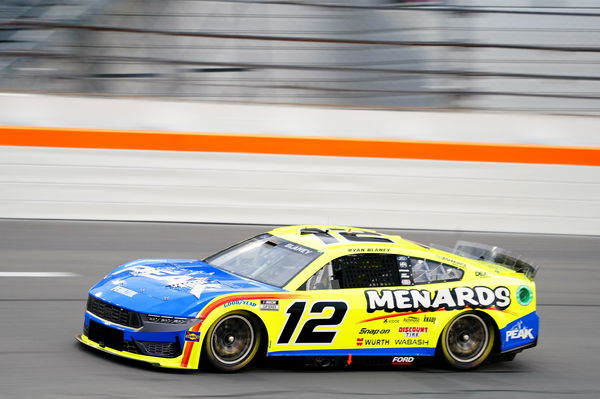
USA Today via Reuters
Feb 16, 2024; Daytona Beach, Florida, USA; NASCAR Cup Series driver Ryan Blaney (12) during practice for the Daytona 500 at Daytona International Speedway. Mandatory Credit: John David Mercer-USA TODAY Sports

USA Today via Reuters
Feb 16, 2024; Daytona Beach, Florida, USA; NASCAR Cup Series driver Ryan Blaney (12) during practice for the Daytona 500 at Daytona International Speedway. Mandatory Credit: John David Mercer-USA TODAY Sports
True traditionalists will say a champion should be crowned based on consistency throughout the season, but for Blaney and Team Penske, it mattered more to ride the playoff pressure and deliver when it counted. The NASCAR playoff format has been one of the most contentious topics within the sport. Critics argue that it rewards short-term success rather than season-long dominance. But for Ryan Blaney and Team Penske, the current format played a crucial role in winning the 2023 NASCAR Cup Series Championship.
While Blaney himself has criticized the system as not being fair, there is no doubt that the elimination-style playoffs gave him and his team a chance to step up when it counted the most.
ADVERTISEMENT
Article continues below this ad
Blaney’s Playoff Run: Stepping Up When It Counts
Unlike previous champions that dominated the season, Blaney’s 2023 season focused more on a timely performance along with strategic playoff execution. Given that he never entered the playoffs as a top title contender despite winning only a single race for the entire regular season, victory at the Coca-Cola 600 gave him one of the rarest wins which secured his ticket to the playoff, giving him a chance in the title after an inconsistent regular season.
Despite this, RBlaney, who benefitted from the system, was skeptical of the fairness of it all. “I don’t personally like the win-in-you’re-in thing. I think you just give it to the top 16 or however many guys get into the playoffs, you know? That would just kind of negate some of this stuff.” While he acknowledged the unpredictability it brings, the format undeniably allowed him to become a champion in a way that may not have been possible under the old system.
Once the playoffs started back in 2023, Blaney and Team Penske really turned up the heat, winning the Round of 12 event at Talladega to advance even further on his way to seeing strong finishes when the time was right. This elimination format, which resets the championship battle every three races, works well in the favor of participants who happen to have shown poorer runs earlier in the season. His ability to capitalize on the system’s structure ultimately propelled him into the Championship 4, where he outperformed his competitors at Phoenix to claim his first NASCAR Cup Series title.

via Imago
NASCAR, Motorsport, USA NASCAR Cup Series Championship Nov 10, 2024 Avondale, Arizona, USA NASCAR Cup Series driver Ryan Blaney prior to the NASCAR Cup Series Championship race at Phoenix Raceway. Avondale Phoenix Raceway Arizona USA, EDITORIAL USE ONLY PUBLICATIONxINxGERxSUIxAUTxONLY Copyright: xMarkxJ.xRebilasx 20241110_mjr_su5_019
The crux of the matter is the same. The format is unforgiving for drivers who finish in the top few ranks in every race but do not manage a win. Is it unfair? That’s for NASCAR to decide. It’s not like the format hasn’t allowed teams to come up with strategies. Team Penske, as a whole, managed to build off the format.
It’s not just Blaney who capitalized on this system. His teammate, Joey Logano, enjoyed similar benefits. Despite a suboptimal season in the build-up to the Round of 8, Logano was out of the running at Charlotte, and with Byron’s disqualification, he made it to the final 8 drivers. From here, the driver who had a 17.11 average finish had a simple formula. Win a race, get into the final 4, and then dominate.
ADVERTISEMENT
Article continues below this ad
What’s your perspective on:
Did Ryan Blaney truly earn his championship, or did the playoff format hand it to him?
Have an interesting take?
Trending
Ryan Blaney vindicated as NASCAR updates controversial Damaged Vehicle Policy
Ryan Blaney’s frustrating experience at Watkins Glen in 2023 reignited debates over NASCAR’s Damaged Vehicle Policy (DVP) after he was denied the chance to continue racing despite insisting his car was still drivable. Under the old rules, any car towed to the garage was automatically ruled out, leaving drivers and teams with no say in the matter. Blaney, who was caught in a Lap 1 wreck, argued that his car only had minor damage and should have been allowed to return.
Expressing his frustration, he said, “The biggest issue is, how is someone in the tower, not a part of the race, telling us that we’re done? Like, let us at least look at it and fix it.” After backlash from drivers and fans, NASCAR has finally responded by implementing long-awaited changes to the DVP for the 2025 season. Under the revised policy, teams—not NASCAR officials—will now decide whether a damaged car can return to the race. The initial seven-minute repair rule remains unchanged, meaning teams must complete on-track fixes within that window. However, if more extensive repairs are needed, the car can now be taken to the garage without a timer, allowing the crew to attempt a full restoration.
ADVERTISEMENT
Article continues below this ad
Additionally, cars that cannot reach pit road due to flat tires or excessive damage will no longer be automatically disqualified—they will be towed to the garage, where teams can work on them. For Blaney, who felt robbed of an opportunity at Watkins Glen, this update is a major victory. “Yes, I like that a lot. I am a big supporter of that. I don’t know why it got to where it was with the DVP because it just created controversy.” While the changes provide more flexibility for teams, NASCAR has emphasized that penalties for exceeding the repair time limits will remain strict. If a team fails to get the car back on track within the allotted time, it will still be ruled out.
ADVERTISEMENT
ADVERTISEMENT
ADVERTISEMENT
ADVERTISEMENT


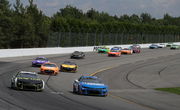
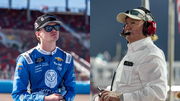

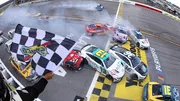
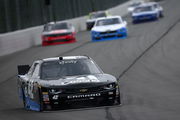
Did Ryan Blaney truly earn his championship, or did the playoff format hand it to him?